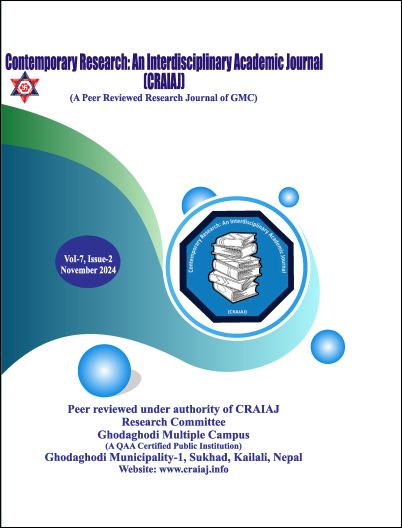The Influence of Poverty on Students’ Class Engagement in Community Schools of Nepal
DOI:
https://doi.org/10.3126/craiaj.v7i2.72147Keywords:
Academic performance, assignment submission, class engagement, community schools, Nepal, povertyAbstract
The relationship between poverty and education is complex and interdependent. Poverty limits access to quality schools and educational resources, leading to lower academic performance and class engagement. The main objective of this study is to analyze the effectiveness of poverty on class engagement and assignment submission. A cross-sectional survey method has been applied with a quantitative and positivist philosophical setting. The sample size of five hundred thirty was selected from 20 community schools in Jhapa and Morang through stratified sampling, where poverty identification was based on the Nepal Multidimensional Poverty Index (MMPI), 2021. Data were collected using a semi-structured questionnaire, structured observation, and structured interviews, and were analyzed within a logistic regression framework using Stata 18. From the collected data it is discovered that 90 percent of students are far from better learning resources and about 50 percent of students living in poverty have fewer opportunities to correct assignments regularly. The majority of poor students who do not complete homework within the deadline are punished physically. Similarly, more than 70 percent of students living in poverty have no access to interaction and learning support. Similarly, students living in poverty participate less actively in class during the submission and correction of assignments. Poverty-stricken students have not taken full advantage of their educational prospects. The study further suggests that quality education for students living in poverty is possible through the provision of quality educational resources, support to teachers and families, and the implementation of programs that address the specific needs of children.
Downloads
Downloads
Published
How to Cite
Issue
Section
License
Copyright (c) 2024 Ghodaghodi Multiple Campus, CRAIAJ

This work is licensed under a Creative Commons Attribution-NonCommercial-NoDerivatives 4.0 International License.
© Ghodaghodi Multiple Campus, Research Committee, RMC

This work is licensed under a Creative Commons Attribution-NonCommercial-NoDerivatives 4.0 International License. This license enables reusers to copy and distribute the material in any medium or format in unadapted form only, for noncommercial purposes only, and only so long as attribution is given to the creator.




